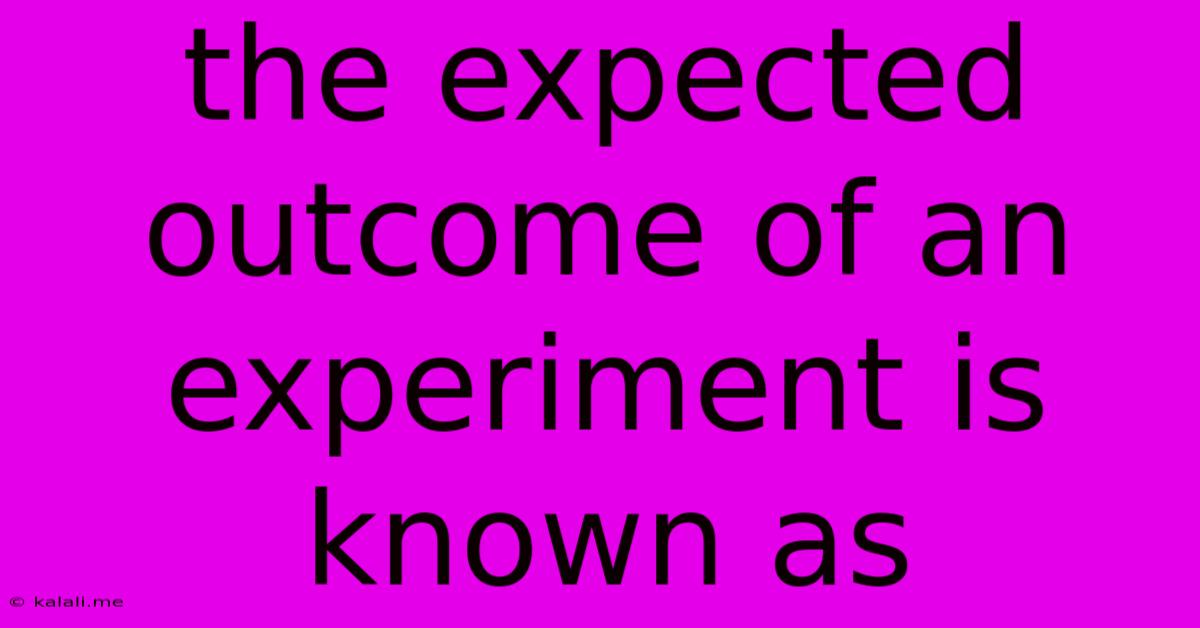The Expected Outcome Of An Experiment Is Known As
Kalali
May 09, 2025 · 3 min read

Table of Contents
The Expected Outcome of an Experiment: Understanding Hypotheses and Predictions
The expected outcome of an experiment is known as a hypothesis, often expressed as a prediction. While the terms are sometimes used interchangeably, there's a subtle difference that's crucial in scientific research. This article will delve into the distinction between a hypothesis and a prediction, exploring their roles in experimental design and interpretation. Understanding these concepts is vital for anyone conducting research or analyzing experimental data.
What is a Hypothesis?
A hypothesis is a testable statement that proposes a possible relationship between two or more variables. It's a reasoned guess, based on existing knowledge and observations, about how things work. A strong hypothesis is:
- Specific and clear: It avoids ambiguity and clearly defines the variables involved.
- Testable: It can be verified or refuted through experimentation or observation.
- Falsifiable: It can be proven wrong. This is a crucial aspect of the scientific method; a hypothesis that can't be proven wrong isn't scientifically useful.
- Measurable: The variables involved can be quantified and measured.
For example, a hypothesis might be: "Increased sunlight exposure will lead to increased plant growth." This statement proposes a relationship between sunlight (independent variable) and plant growth (dependent variable), and it's testable through a controlled experiment.
What is a Prediction?
A prediction is a specific statement about what the researcher expects to observe if the hypothesis is correct. It’s a more concrete and directly observable consequence of the hypothesis. It often takes the form of "If...then..." statements.
Using the example above, a prediction based on the hypothesis would be: "If plants are exposed to increased sunlight, then their height will be significantly greater than plants exposed to less sunlight after a period of four weeks." This prediction specifies the expected outcome under specific conditions, making it easier to evaluate the results of the experiment.
The Relationship Between Hypothesis and Prediction
The hypothesis provides the general framework for the experiment, while the prediction outlines the specific observable outcome expected. The prediction is directly derived from the hypothesis and is crucial for designing the experiment and interpreting its results. A well-defined prediction guides the choice of experimental design, data collection methods, and statistical analysis.
Testing the Hypothesis and Evaluating Results
The experiment is designed to test the prediction. If the experimental results support the prediction, it lends credence to the hypothesis. However, it doesn't "prove" the hypothesis; scientific knowledge is built through repeated testing and accumulation of evidence. If the results contradict the prediction, the hypothesis may need to be revised or rejected. This iterative process is the core of the scientific method.
Examples in Different Fields
- Biology: Hypothesis: "Exposure to a new antibiotic will inhibit the growth of E. coli bacteria." Prediction: "Bacterial colonies grown in the presence of the antibiotic will exhibit significantly less growth than control colonies after 24 hours."
- Psychology: Hypothesis: "Individuals with higher levels of stress will report lower levels of job satisfaction." Prediction: "Participants reporting higher stress scores on a standardized questionnaire will score significantly lower on a job satisfaction scale."
- Physics: Hypothesis: "Increasing the mass of an object will increase its gravitational pull." Prediction: "Two objects of different masses placed at a fixed distance will exert a measurable difference in gravitational force on each other."
In conclusion, while often used interchangeably, a hypothesis is a testable statement proposing a relationship between variables, whereas a prediction is a specific statement about the expected outcome of an experiment based on that hypothesis. Both are essential components of the scientific method, guiding the design, execution, and interpretation of experiments. Understanding the difference between these concepts is key to conducting rigorous and meaningful research.
Latest Posts
Latest Posts
-
How Long Would It Take To Walk To China
Jul 06, 2025
-
Step Up To The Streets Final Dance
Jul 06, 2025
-
How Many Grams Is Half An Oz
Jul 06, 2025
-
How Much Is 10 Quarters In Dollars
Jul 06, 2025
-
How Do You Beat Stage 9 On Bloxorz
Jul 06, 2025
Related Post
Thank you for visiting our website which covers about The Expected Outcome Of An Experiment Is Known As . We hope the information provided has been useful to you. Feel free to contact us if you have any questions or need further assistance. See you next time and don't miss to bookmark.